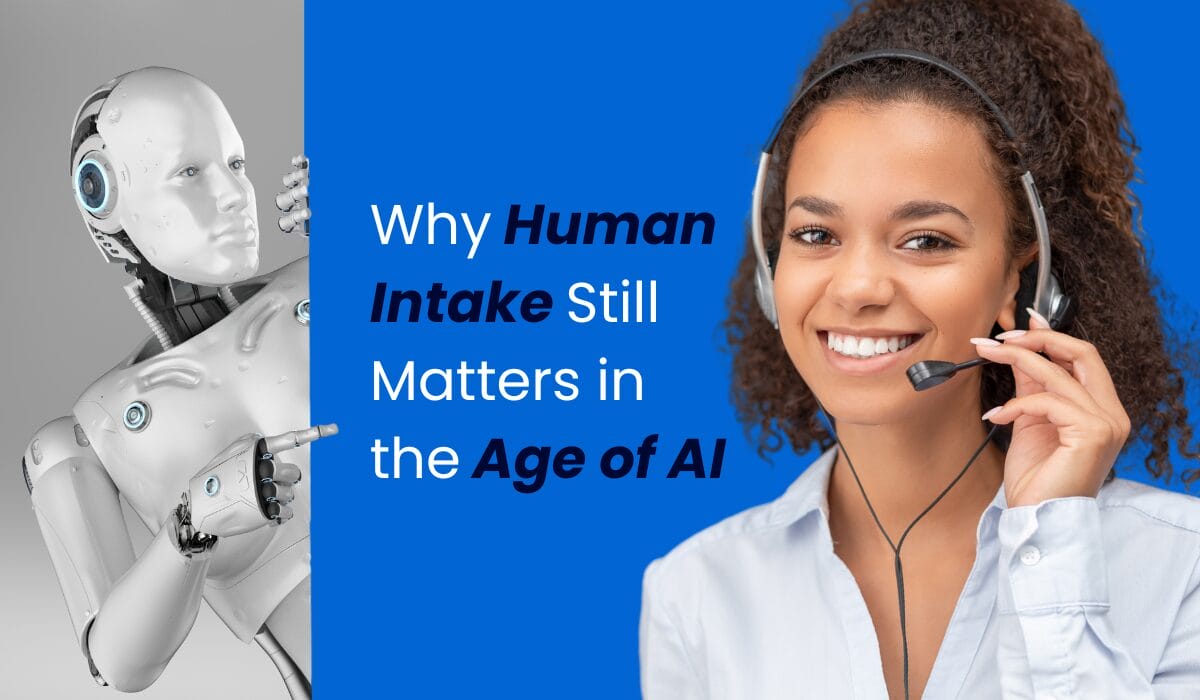There’s no denying it: artificial intelligence is shaking up industries left and right, and legal intake is no exception. With podcasts like All-In declaring that AI will wipe out call centers in the next few years, it’s easy to get swept up in the idea that robots will soon be doing all the heavy lifting in client acquisition.
But here’s the kicker: when it comes to mass tort and personal injury law, human intake isn’t going anywhere anytime soon. While AI might be able to handle some routine inquiries and streamline processes, it simply can’t replicate the emotional intelligence, empathy, and trust-building that human intake specialists provide.
Let’s break down why human intake will remain a non-negotiable part of your law firm’s client acquisition strategy—even as AI keeps evolving.
1. AI Can Open the Door, But Humans Close the Deal
Sure, AI is getting pretty slick. From chatbots handling initial web inquiries to AI-driven call routing, there’s no doubt that technology can play a huge role in streamlining the intake process. In fact, let AI handle the early stuff—online chats, form submissions, even directing inbound calls. It can help you sort leads faster, prioritize inquiries, and make sure the right clients get to the right people.
But here’s the thing: when it comes to outbound calls and closing the deal, humans still reign supreme. In mass tort and personal injury cases, that first outbound call is where the magic happens. Potential clients who have been injured or harmed want to hear a real, empathetic voice on the other end—not a robotic script reader. These conversations require nuance, trust-building, and the kind of emotional connection AI simply can’t deliver.
2. The Personal Touch is Still King
Mass tort and personal injury cases aren’t your average customer service calls. We’re talking about people who are dealing with life-changing events—injuries, illnesses, or even the loss of a loved one. These are not simple inquiries about refunds or tech support. They are deeply emotional, highly personal conversations that demand compassion and care.
AI might be able to simulate conversation, but it can’t read the room. It can’t respond to tears, fear, or frustration in the same way a trained human intake specialist can. Legal intake isn’t about transactional data collection; it’s about connecting with people who are in distress, guiding them through a complicated legal process, and making sure they feel understood and supported. That’s not something AI can fake.
3. Regulations Will Pump the Brakes on AI Outbound Calls
Let’s talk about regulations—because this is where AI’s grand takeover plan hits a speed bump. Governments are already stepping in to regulate AI usage, especially in sensitive industries like legal services. One regulation we’re likely to see soon? Requiring AI voices to be labeled as such on outbound calls.
For potential clients in mass tort and personal injury cases, the moment they realize they’re talking to a robot instead of a real person could be a dealbreaker. Older clients, in particular, are more likely to trust a human voice—someone who can listen to their concerns and respond with empathy, not a pre-programmed response. Trust is everything in legal intake, and AI risks losing that trust before the conversation even starts.
4. AI Can’t Handle the Heavy Lifting of Client Consultations
Initial contact is one thing, but consultations? That’s a whole different ballgame. Once you’ve established that first connection with a potential client, the follow-up consultation is where the real work begins. This is where you dive into the details of their case, assess their legal options, and make sure they feel confident moving forward.
AI isn’t equipped for this level of complexity. Sure, it can answer FAQs or walk someone through a basic process. But when it comes to discussing the specifics of someone’s injury, the pain they’re feeling, or the legal ramifications of their situation, only a human can deliver the level of care and expertise required. Consultations need real conversations—not scripted dialogue generated by an algorithm.
5. Your Audience Needs Empathy, Not Automation
Let’s be real: a large portion of the mass tort and personal injury client base is made up of older adults and people dealing with serious medical conditions. These individuals are often scared, overwhelmed, and looking for reassurance. They don’t want to talk to a robot—they need empathy and understanding.
AI may be getting smarter, but it’s not going to replace the human connection that clients crave, especially in moments of vulnerability. Intake specialists provide that personal touch, offering comfort, clarity, and real answers in a way that AI simply can’t. And in the legal world, that’s what turns a lead into a client.
6. AI’s Real Role: Support, Not Replace, Human Intake
Look, AI isn’t the villain here. It has a role to play in helping law firms work more efficiently, saving time on administrative tasks, and ensuring that intake specialists can focus on what they do best: connecting with clients. AI can help sort through leads, identify potential clients, and even provide valuable data insights to support decision-making.
But when it comes to the crucial moments that matter most—the outbound calls, the consultations, the human conversations that build trust and drive conversions—AI just doesn’t cut it. The future of mass tort and personal injury intake isn’t about replacing humans with AI. It’s about integrating AI to enhance the human experience, not replace it.
The Bottom Line: AI might be revolutionizing many industries, but when it comes to mass tort and personal injury law, human intake is here to stay. The most critical parts of the client acquisition process—outbound calls and consultations—require empathy, trust, and emotional intelligence, none of which AI can deliver. So while AI will support intake, it won’t be replacing the people who truly make the difference anytime soon.


